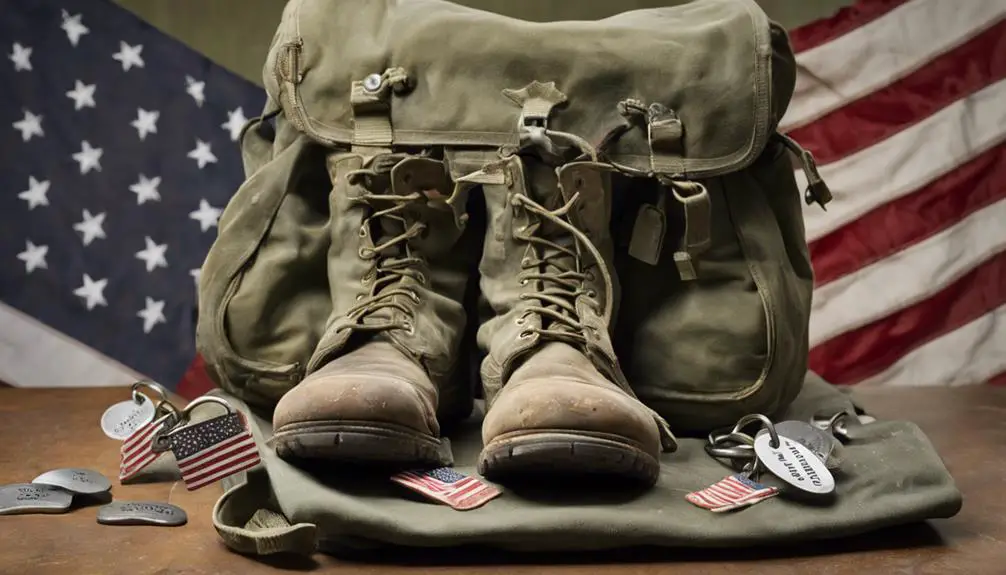You'll quickly learn that in the military, you'll be referred to as 'new meat' or 'FNG' (Freaking New Guy), common slang terms used to describe a replacement, a rookie soldier still finding their footing in the ranks. As a replacement, you'll face intense training, physical and mental tests, and harsh combat realities. You'll need to learn military protocol quickly, master saluting as a sign of respect and discipline, and understand the Uniform Code of Military Justice. As you navigate the challenges of being a newcomer, stay focused, and you'll discover the nuances of military life and your role in it.
Boot Camp Baptism by Fire

What's the first thing that comes to mind when you think of Boot Camp Baptism by Fire? For most, it's the intense, no-nonsense drill instructors who rule with an iron fist. And you're right – they're the masters of drill instructor dynamics. These seasoned veterans know exactly how to break you down and build you back up into a lean, mean fighting machine. You'll quickly learn to show rookie reverence, addressing them as "Drill Instructor" or "Sergeant" at all times. One misstep, and you'll face the wrath of their displeasure. But don't worry, it's all part of the baptism by fire that is boot camp. They're not trying to be cruel; they're preparing you for the harsh realities of combat. You'll be pushed to your limits, tested physically and mentally, and forced to work as a team. It's a trial by fire, but one that will forge you into a formidable warrior. So, buckle up, rookie, and get ready to earn your place among the ranks.
FNG Follies and Foibles
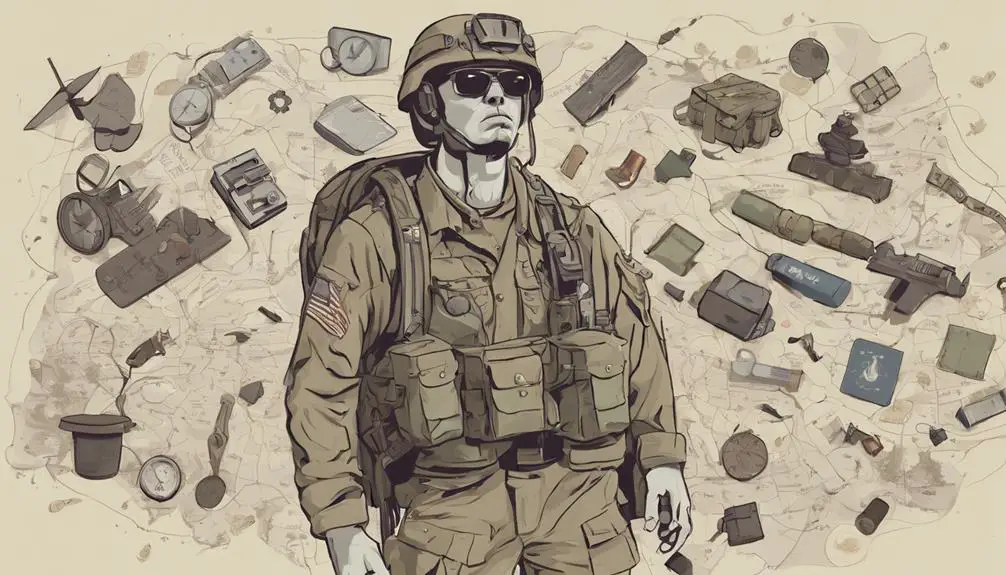
How do you, a fresh-faced FNG (Freaking New Guy), navigate the complexities of military life without becoming the platoon's laughing stock? It's a challenging task, especially when every misstep can be magnified into an FNG faux pas. The newbie nuances of military protocol, etiquette, and jargon can be overwhelming, but it's important to learn them quickly to avoid embarrassing yourself and your unit.
As you stumble through your first weeks, it's vital to pay attention to details. Remember that saluting is not just a casual gesture, but a sign of respect and discipline. Don't assume that your civilian habits will translate to military life; they won't. Familiarize yourself with the Uniform Code of Military Justice (UCMJ) and the chain of command to avoid unintentionally disrespecting your superiors.
In the midst of FNG follies and foibles, it's easy to get caught up in the excitement of new experiences. However, it's important to stay focused and avoid rookie mistakes. Take notes, ask questions, and seek guidance from your NCOs and fellow soldiers. By doing so, you'll minimize the risk of becoming the platoon's laughing stock and set yourself up for success in your military career.
Cherry-Picking Leadership Roles

As you gain confidence in your new role, you'll soon discover that cherry-picking leadership roles is a common pitfall many FNGs fall into, mistakenly believing that taking on too many responsibilities will accelerate their career advancement. However, this approach can lead to burnout, decreased performance, and a lack of focus on critical tasks. Instead, you should focus on developing a deep understanding of your current role and its responsibilities within the command pipeline.
To avoid cherry-picking, prioritize tasks that align with your strengths and capabilities, and delegate or defer tasks that are outside your expertise. This will enable you to build a strong foundation in your current role, positioning you for future leadership opportunities in the leadership pipeline. By doing so, you'll demonstrate your ability to prioritize, delegate, and execute tasks effectively, making you a more attractive candidate for future promotions. Remember, taking on too much too soon can lead to failure, so focus on mastering your current role before seeking additional responsibilities.
Greenhorns in the Ranks
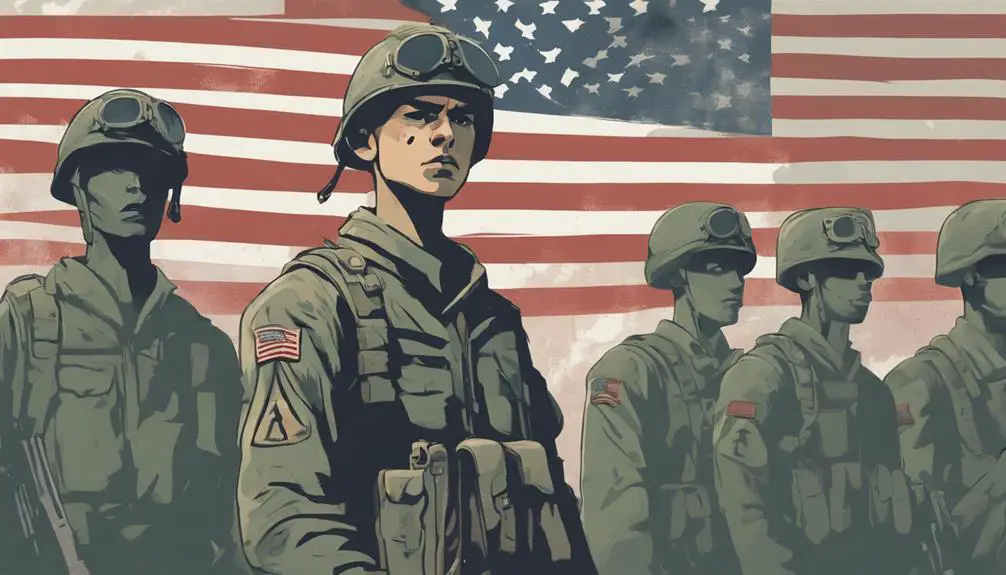
In the ranks, greenhorns, or FNGs (Freaking New Guys), often struggle to find their footing amidst the chaos of a new command, and it's your job as a leader to guide them through the adjustment. You'll need to keep a close eye on these new recruits, as rookie mistakes can be costly. As their leader, it's your responsibility to identify officer material and nurture their growth. Start by assigning them a seasoned mentor who can show them the ropes and provide valuable feedback.
Monitor their progress, and address any knowledge gaps or skill deficiencies promptly. Be prepared to provide constructive criticism and encouragement in equal measure. Remember, greenhorns are like sponges, soaking up information and habits – good or bad. It's essential to instill good habits and a strong work ethic from the outset. By doing so, you'll set them up for success and guarantee a smoother shift into the unit. With your guidance, these FNGs will soon become valuable assets to the team, and you'll be proud to call them your own.
New Meat Mentality
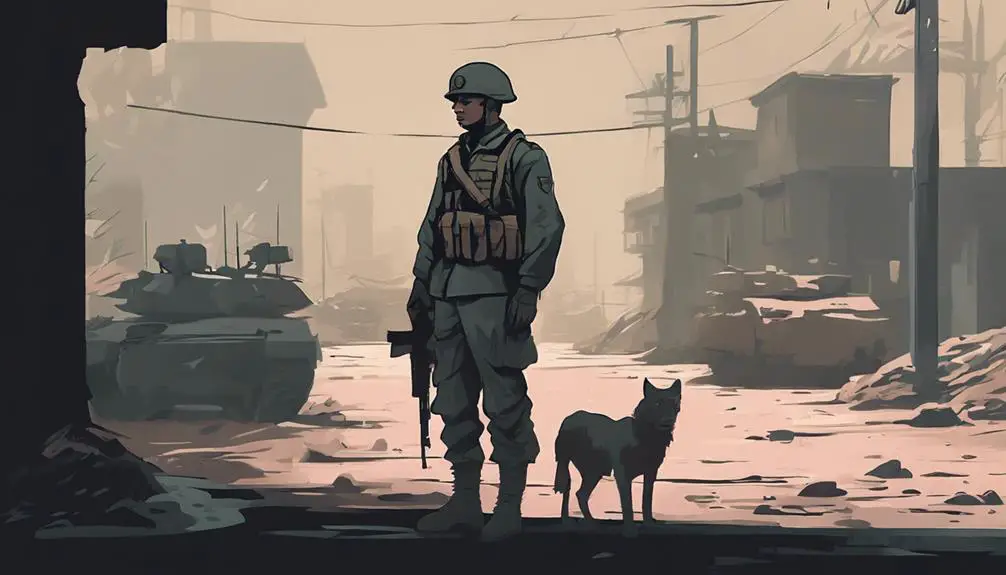
Your new recruits bring a fresh perspective, but also a 'new meat mentality' that can be both an asset and a liability. On one hand, their inexperience can lead to innovative solutions, unencumbered by traditional thinking. On the other hand, their newbie nuances can result in rookie rationalization, where they justify mistakes or oversights due to lack of experience. This mentality can be detrimental to team cohesion and mission success.
As a leader, it's essential to recognize and address these tendencies early on. Provide clear guidance and constructive feedback to help new recruits develop a growth mindset, acknowledging their limitations and actively seeking knowledge. Foster an environment that encourages collaboration and open communication, where rookies feel comfortable asking questions and seeking help. By doing so, you can harness the benefits of fresh perspectives while mitigating the risks associated with new meat mentality.
Rookies on the Frontline

When you're tasked with deploying new recruits to the frontline, you'll need to take into account the unique challenges that come with placing rookies in high-pressure situations. Rookie mistakes can be costly, and it's vital to identify and mitigate potential errors before they escalate into critical failures. Trial by combat is an unforgiving teacher, and it's important to make sure that your new team members are adequately prepared for the rigors of combat.
In high-stress environments, rookie mistakes can spread quickly, compromising the entire unit's effectiveness. It's necessary to implement rigorous training protocols to identify and correct rookie mistakes before they become ingrained habits. This includes emphasizing situational awareness, communication protocols, and adaptability in the face of uncertainty. By doing so, you can minimize the risk of rookie mistakes and ensure a smoother shift for new recruits into the frontline.
Replacing the Old Guard

How do you guarantee a smooth handover of power when replacing seasoned veterans with fresh faces, and what metrics do you use to evaluate the readiness of new recruits to assume critical roles? In a military context, the Old Guard Revamp is a deliberate process of phasing out experienced personnel and integrating new blood into the system. This Generation Shift requires careful planning to secure continuity and minimize disruptions.
You'll need to establish clear benchmarks to gauge the proficiency of incoming personnel. This includes appraising their technical skills, tactical knowledge, and ability to work effectively in teams. It's crucial to identify potential knowledge gaps and provide targeted training to address these deficiencies. Additionally, you should establish a mentorship program, pairing new recruits with experienced veterans to facilitate knowledge transfer and guarantee a seamless handover.
Fresh Faces in Combat
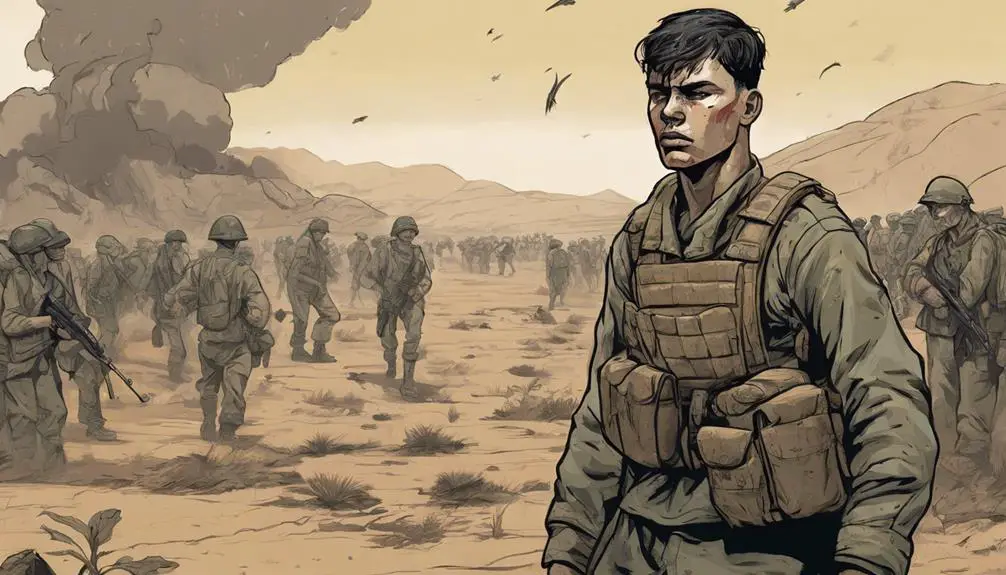
As you integrate new personnel into combat units, it's imperative you assess their combat readiness, making sure they can effectively execute tactics and respond to threats in high-stress environments. This is particularly important for combat rookies, often referred to as 'war virgins' due to their lack of real-world combat experience. These individuals require targeted training to bridge the gap between theoretical knowledge and practical application.
You must evaluate their ability to work cohesively as a team, think critically, and adapt to changing situations. It's necessary to identify knowledge gaps and provide remedial training where necessary. This might involve additional instruction on combat tactics, first aid, or communication protocols. By doing so, you can ensure that fresh faces in combat are adequately prepared to face the challenges of modern warfare. Remember, the success of your mission depends on the proficiency of your team, so it's important to invest time and resources in their development.
Inexperienced Eyes on Target

In the heat of battle, inexperienced eyes on target can be a liability, and it's essential you identify and address any deficiencies in their marksmanship skills to prevent friendly fire or collateral damage. As a combat leader, it's imperative you recognize the telltale signs of combat virginity, such as hesitation, poor trigger control, and inadequate breathing techniques. Rookie mistakes can be costly, and it's your responsibility to correct them before they become ingrained habits.
When evaluating a rookie's marksmanship skills, look for signs of anxiety, like a high heart rate, sweating, or fumbling with equipment. These indicators often precede rookie mistakes, like jerking the trigger or failing to follow through on a shot. To correct these issues, you must provide constructive feedback, focusing on specific skills like sight alignment, breathing control, and trigger squeeze. By addressing these deficiencies, you'll help your rookie teammates overcome their combat virginity, reducing the risk of friendly fire and collateral damage. Remember, effective marksmanship training is key to minimizing rookie mistakes and ensuring mission success.
Baptism by Combat Fire
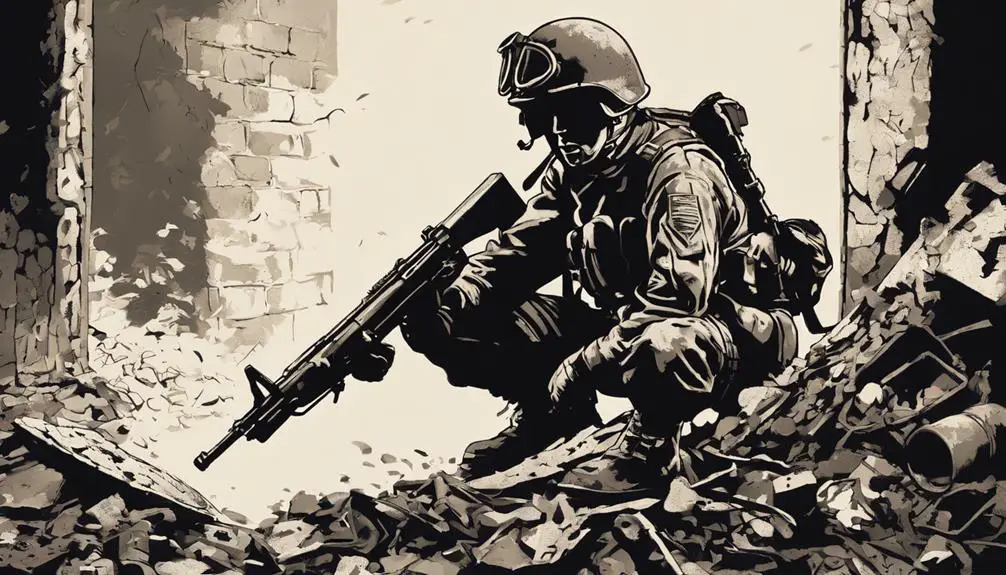
During your baptism by combat fire, you'll quickly realize that the chaos of war is a far cry from the controlled environment of a firing range, where you'll be forced to adapt your marksmanship skills to survive. This intense combat trial will push you to the limit, forcing you to think on your feet and react instinctively to the unfolding situation.
As you're thrust into the midst of battle, you'll experience the rush of adrenaline as you face the enemy head-on. Fire initiation will become second nature as you respond to the hail of bullets and explosions erupting around you. Your senses will be overwhelmed, but you must remain focused and composed to emerge victorious.
In this baptism by combat fire, every second counts, and hesitation can be fatal. You'll need to trust your training, rely on your instincts, and make split-second decisions to stay alive. As you navigate the treacherous landscape of war, remember that your survival depends on your ability to adapt, improvise, and overcome.
Frequently Asked Questions
What's the Most Common Mistake New Recruits Make in Combat?
You'll often find new recruits making the critical mistake of underestimating combat stress in the heat of battle. As a result, they neglect to maintain battlefield awareness, failing to continuously assess their surroundings and adapt to changing circumstances. This oversight can prove catastrophic, as it leaves them vulnerable to ambushes and exposes them to unnecessary risks.
Can You Get Kicked Out of the Military for Being Too Slow?
If you're consistently slowing down ops or failing fitness tests, you're at risk of being kicked out of the military. Your commanders will evaluate your performance, and if you're deemed unfit for duty, you could face administrative separation. Slowing down operations can compromise mission success, and failing fitness tests indicates a lack of commitment to physical readiness.
How Long Does It Take to Adjust to Military Life?
You might think adjusting to military life will be a cakewalk, but it's not that easy. It takes time to overcome culture shock, and it's not just about following orders. Mental preparation is key to a smooth adjustment. Expect a 3-6 month adaptation period, during which you'll adapt to the rigorous routine, learn new skills, and develop a sense of belonging. Be patient, stay focused, and you'll thrive in your new environment.
Do Officers Get Special Treatment During Boot Camp?
You may wonder if officers get special treatment during boot camp. The answer is, it's not exactly a free pass, but they do receive some perks. Officer privileges, like more lenient rules and better living conditions, can create a favoritism culture. However, this doesn't mean they're exempt from challenges. You'll still see them sweating alongside you, pushing themselves to meet the same physical and mental standards as everyone else.
Can You Request a Specific Deployment Location?
You're wondering if you can request a specific deployment location. Investigating this theory reveals that the answer is yes, but with caveats. The military uses a duty station bidding process, where you can submit deployment preferences. However, final assignments are based on the needs of the service, and your requests are not guaranteed. Factors like unit requirements, skillset, and operational demands are prioritized over personal preferences, so flexibility is essential.

